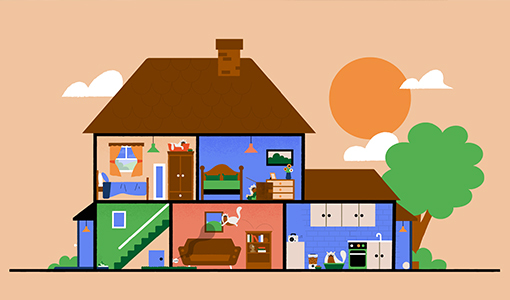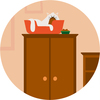If your cat has been diagnosed with cystitis, which is an inflammation of the bladder, your vet has probably already suggested a course of treatment. This could be anti-inflammatory medicine, a special anti-cystitis diet or nutritional supplements. But what about the cause?
I see a lot of cats with cystitis and it’s often because there are factors in the cat’s environment that are causing her anxiety. One of the main triggers for cystitis in cats is stress. So identifying any potential sources of anxiety and finding ways to help her relax again can be a huge help. Here are some ideas you can try at home:


1. Plug in some support
Feline pheromone diffusers can provide invaluable ‘back-up’ support when used in the areas where your cat likes to rest and relax. But it’s important to choose the right type. There’s some that are better for easing friction and tension between the cats in your home and others that work well if your cat is becoming anxious because of changes to her environment, like the arrival of a new baby.

2. Establish a safe space
You can help your cat feel secure by tapping into her natural feline behaviours. Create a ‘safe haven’, which your cat can escape to easily when she feels anxious. This is especially important in multi-pet households, or in homes with small children. For example, give your cat a space with all the resources she needs, like a litter tray, food and a water station, all placed in separate parts of the room.

3. Think upwards
Your cat needs high-up places to help her feel safe and secure. A floor-to-ceiling cat tree is ideal. But simply creating safe and secure access to the top of a wardrobe or on a tall cupboard can work, too. Once the space is cleared, add a comfy bed and some treats, and your cat will be naturally drawn to that space.

4. Create secret hideaways
Low hiding places are crucial, too. I often go into modern open-plan apartments with big empty spaces, which can be very stressful for timid cats because they like to feel invisible. Put a few cardboard boxes on their sides on the floor with a piece of your worn clothing inside. These spaces will help your cat feel more secure when you’re not there.

5. Establish escape routes
In a multi-pet household, a bold cat can ‘block’ certain areas, like a narrow hallway, and this can become a no-go area. The answer is to provide an escape route for more timid cats, like a raised ‘path’ via a bookshelf or a console table.

6. Lessen external threats
Floor-to-ceiling windows can be scary for your cat, because being able to see neighbouring cats through a large window can feel very threatening to some cats. Try to avoid placing food bowls or the litter tray near windows and think about how to shield your cat from unwanted visitors. For a quick-fix method, try frosting the lower half of the windows with removable film. It doesn’t have to be permanent, but not being able see other animals outside can make an immediate difference to your cat’s stress levels.

7. Switch it on
Leave the radio or TV on at a low volume level when your cat has to spend long periods of time alone. It helps to mimic busier times when your cat feels safe and supported. The sound can also help to distract your pet from unexpected noises outside.

8. Re-position the litter tray
Although your cat might usually toilet outside, you can also provide an indoor litter. If you have a multi-cat household, make sure you have one tray per cat plus one extra. Locate them in different areas of the house, well away from windows, noisy household appliances and busy areas. This will allow your cats to toilet in private.
Avoid hooded litter trays or tray liners as they will feel unnatural to cats and that can also be stressful. Just a simple, open tray, with an unscented, fine-grained clumping litter is fine.

9. Provide several water stations
A cat with cystitis should be encouraged to drink more water. This can be difficult, so try using different types of bowls in several places, and perhaps a water fountain. To avoid an unpleasant taste, try ceramic bowls instead of plastic or metal. Rather than using deep-sided bowls, try shallow ones so your cat can see what’s going on around them at the same time. This will also avoid their whiskers brushing against the side of the bowl which can be irritating for them. You can encourage your cat to drink by adding an ice cube flavoured with tuna water or unsalted chicken stock.

10. Keep home scents neutral
Cats are very challenged by scent so that’s another potential stress-point. You can unknowingly bring in the smell of neighbourhood cats on your shoes, pram wheels, and even on the base of your shopping bags. Removing your shoes near the door, unpacking shopping bags straight away, rather than putting them on the floor, and wiping down pram wheels with a pet-safe cleaner before spraying with a pheromone dispenser, can all help. I also recommend avoiding strongly scented home fragrance products, including plug-in ‘puff-out’ diffusers and fragranced candles.

11. Feed little and often
In the wild, your cat will normally eat many small meals each day, so two big bowls of food could lead to a build-up of frustration and anxiety. You can ease that stress by feeding little and often – using a pop-up timer when you’re not there, or putting smaller portions in different places around the house and letting your cat discover them.

12. Try some scent exchange
Finally, if you’ve recently renovated your home and brought in new furniture, your cat will settle more easily if her own scent can be detected. Take a soft cloth and gently wipe her chin and jawline, then wipe that cloth onto the surface of newly painted walls or onto new furniture at your cat’s height. Your cat will instantly feel more at home, more relaxed and hopefully less likely to have a recurrence of cystitis.
